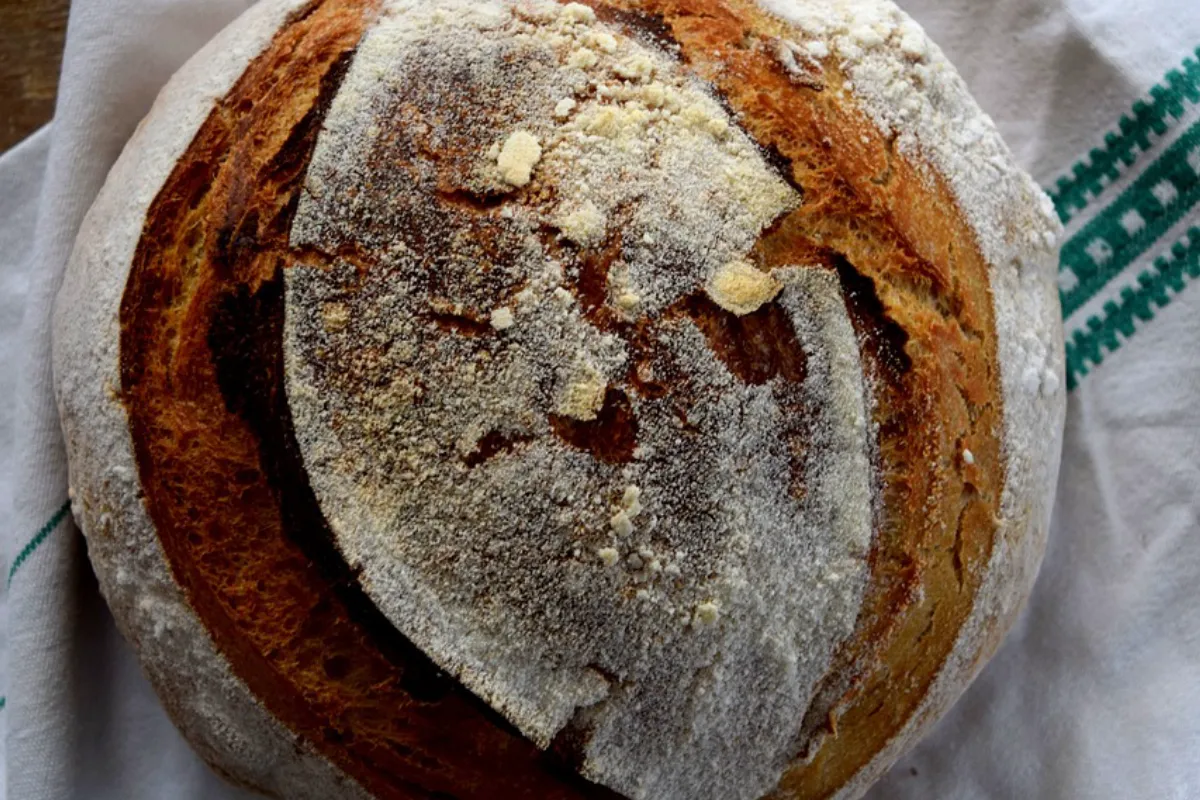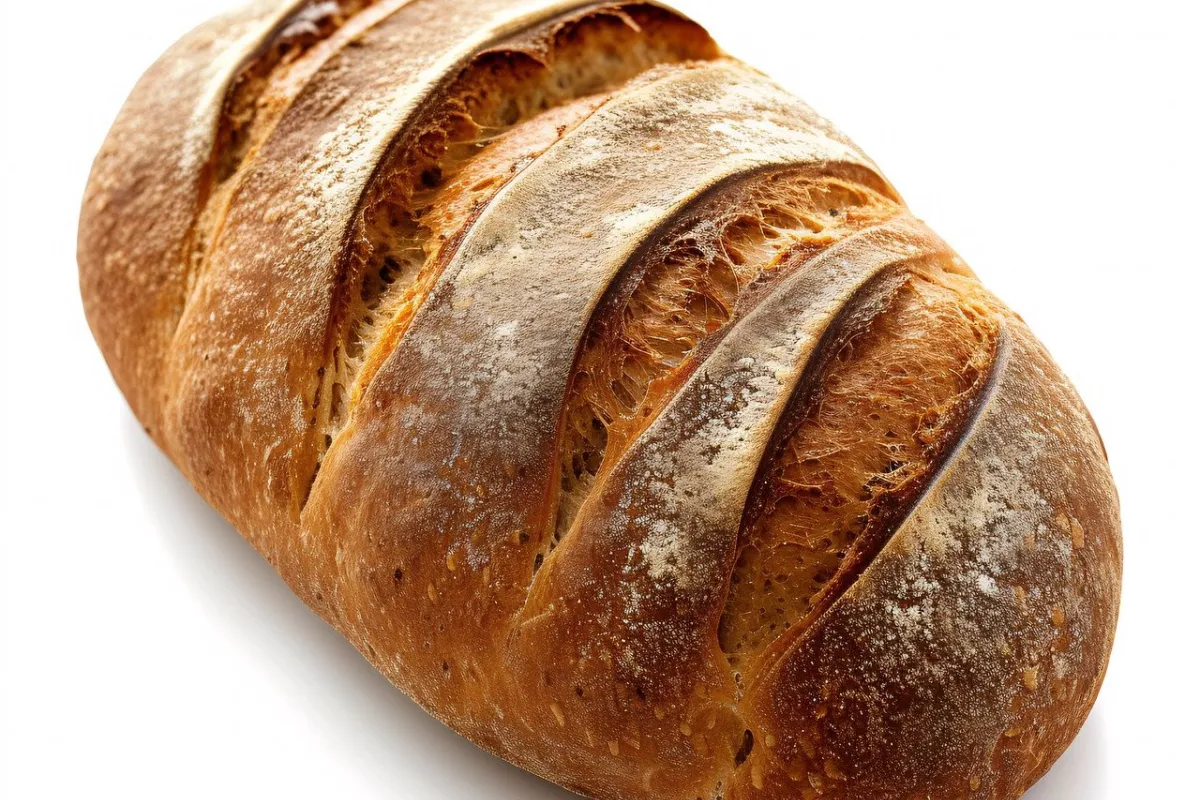Sourdough baking has become very popular, and with it, the use of sourdough discard. This leftover from feeding a sourdough starter can be used in many recipes. But beyond avoiding waste, some people wonder: Is sourdough discard good for the gut? The connection between sourdough discard and gut health is mainly due to the fermentation process and the presence of good bacteria. This helps with digestion.
In this article, we’ll look at how sourdough discard might help your gut, how it supports a healthy gut, and if it should be part of your diet.
What is Sourdough Discard?
Sourdough discard is the portion of a sourdough starter that is thrown away when feeding the starter. To keep the starter active and from getting too sour, you need to throw some of it out. This is called discard, and it can be used in recipes like pancakes, crackers, and biscuits.
Many people use sourdough discard to avoid waste, but is there more to it? To answer that, we need to know how fermentation works and how it affects the gut.
How Fermentation Helps Gut Health

Fermentation is a natural process where bacteria like lactic acid bacteria (LAB) and yeast break down sugars in the dough. This creates lactic acid, which gives sourdough its tangy taste. But besides adding flavor, fermentation creates compounds that can help with digestion.
In sourdough, lactic acid bacteria are very important. They not only add to the taste but also help support the growth of good bacteria in the gut. According to research from the National Institutes of Health, sourdough bread is easier to digest than regular bread because the fermentation process helps break down tough-to-digest carbohydrates and proteins.
The fermentation process also creates prebiotic compounds, which act as food for the good bacteria in your gut. These compounds are found in both sourdough bread and sourdough discard. Even though discard doesn’t ferment as long as bread, it still has these helpful compounds.
To learn more about how fermentation helps digestion, you can read Harvard Health’s guide on fermented foods, which explains how fermented foods like sourdough are good for gut health.
Prebiotic Benefits of Sourdough Discard
Sourdough discard is rich in prebiotics, which are fibers that feed the good bacteria in your gut. Prebiotics help keep the good bacteria in balance, which is important for digestion and your immune system. When you eat foods with prebiotics, you help the good bacteria in your gut grow.
- Prebiotic benefits: The prebiotics in sourdough discard help support the growth of good gut bacteria.
- Improved digestion: Prebiotics make digestion easier and help the body absorb nutrients better.
Unlike probiotics, which add live bacteria to your gut, prebiotics feed the bacteria already in your gut. Sourdough discard, because it contains prebiotics, can help keep your gut healthy by feeding these good bacteria. This makes sourdough discard a helpful addition to a diet that is already rich in probiotics.
The Role of Lactic Acid Bacteria
A key reason sourdough discard is good for your gut is because of the lactic acid bacteria in it. These bacteria help balance the bacteria in your gut, making it easier to digest food. They also create a more acidic environment in the gut, which stops harmful bacteria from growing.
Even though discard might not have as many live bacteria as fully fermented sourdough bread, it still has a lot of the benefits of fermentation. For people with mild digestive issues, or those wanting to improve gut health, sourdough discard is an easy way to get these benefits without needing to bake a whole loaf of bread.
Nutrient Availability in Sourdough Discard
Another big benefit of sourdough discard is that it makes nutrients easier to absorb. Fermentation reduces phytic acid, which is found in grains and can block the absorption of minerals like iron, magnesium, and zinc. By lowering the amount of phytic acid in sourdough discard, fermentation makes it easier for the body to absorb these important minerals.
How Fermentation Improves Nutrient Absorption
- Less phytic acid: Fermentation lowers phytic acid, which helps the body absorb minerals better.
- Better absorption of minerals: Nutrients like iron, calcium, and magnesium are easier for the body to absorb after fermentation.
This makes sourdough discard a healthier choice than baked goods made from unfermented flour.
Gluten Sensitivity and Sourdough Discard
A lot of people turn to sourdough because of its effect on gluten. Gluten is a protein in wheat that can be hard to digest for some people, especially those with gluten sensitivity. The fermentation process in sourdough helps break down gluten, which makes it easier for some people to digest.
Although sourdough discard still contains gluten, the fermentation process reduces the gluten content, which makes it a better option for those with mild gluten sensitivity. However, it is not gluten-free and should not be eaten by people with celiac disease.
Benefits for People Sensitive to Gluten
- Less gluten: Fermentation breaks down some of the gluten, which makes sourdough discard easier to digest for people with mild sensitivity.
- Less bloating: Some people feel less bloated after eating sourdough discard compared to other baked goods.
While it’s not right for everyone, sourdough discard could be a better choice for people who have trouble digesting gluten but do not have celiac disease.
Comparing Sourdough Discard to Other Fermented Foods
When comparing sourdough discard to other fermented foods like yogurt, kefir, and kimchi, the main difference is the amount of probiotics and prebiotics they contain. Foods like yogurt and kefir are full of live probiotics, while sourdough discard mainly provides prebiotics that feed the good bacteria already in the gut.
- Probiotics in yogurt and kefir: These foods introduce live bacteria into the gut.
- Prebiotics in sourdough discard: Discard helps feed the good bacteria that are already there, helping overall gut health.
While sourdough discard doesn’t have the same level of probiotics as yogurt or kefir, it can still be a great addition to a diet full of probiotics. Together, these foods can improve gut health by supporting a healthy balance of bacteria.
How Sourdough Discard Complements Other Fermented Foods
- Probiotic-rich foods: Yogurt, kefir, and kimchi add live bacteria to the gut.
- Prebiotic content: Sourdough discard helps feed these bacteria, keeping the gut balanced.
To get the most out of both, try combining sourdough discard with foods rich in probiotics.
Downsides of Sourdough Discard
Even though sourdough discard has a lot of benefits, there are some downsides too. Some people may feel bloated or uncomfortable after eating sourdough or other fermented foods. This is usually caused by gases and acids made during fermentation, which can lead to bloating or discomfort for some For more details Does Sourdough Discard Still Have Health Benefits
Common Digestive Issues with Fermented Foods
- Bloating and gas: Some people may feel bloated because of the gases created during fermentation.
- Acidic nature: The acid produced during fermentation may upset sensitive stomachs.
People with gluten intolerance or celiac disease should avoid sourdough discard since it still contains gluten. But for others, sourdough discard might be a gentler option than other baked goods, though it’s important to see how your body reacts.
How to Get the Most Out of Sourdough Discard for Gut Health
To get the most benefits for your gut from sourdough discard, it’s important to use recipes that let the discard ferment for a longer time. The longer the dough, the more lactic acid and it produces, which are good for your gut.
Also, combining sourdough discard with other foods, like vegetables high in fiber or whole grains, can improve.
Tips for Improving Gut Health with Sourdough Discard
- Allow longer fermentation: Letting the discard ferment for longer increases the amount of good bacteria and helpful.
- Pair with fiber-rich foods: Mix sourdough discard with whole grains or foods to help with.
Recipes Using Sourdough Discard for Gut Health
Here are a few easy recipes to add discard to your diet in a way that helps your gut:
Sourdough Pancakes
Sourdough Pancakes are a quick and simple way to use discard while getting the benefits of fermentation. For added fiber, top with fruits like or serve with yogurt for extra .
Sourdough Crackers
Sourdough made from discard are another great choice. They’re easy to make, and the process makes them easier to digest. Pair these with a dip made for a snack.
Sourdough Biscuits
For a baked good, try sourdough biscuits. Letting the dough ferment overnight can increase the content and make them easier to digest. Serve with a spread like kefir butter for added gut health benefits.
FAQs About Sourdough Discard and Gut Health
Is sourdough discard healthier than regular bread?
Yes, is usually easier to digest than regular bread because the process breaks down carbs and . This makes it easier on the system.
Does sourdough discard provide probiotics?
Sourdough discard doesn’t have as many as foods like yogurt or kefir, but it offers that help feed the good in your gut.
Can people sensitive to gluten eat Sourdough discard?
Sourdough discard has less gluten because of , but it’s not Those with mild gluten may find it easier to digest, but people with celiac disease should avoid it.
What is the difference between starter and Sourdough discard?
Sourdough starter is the active mix used to make bread, while is the portion removed during feeding. Both contain lactic acid , but discard has less power.
Conclusion
Sourdough discard offers many potential benefits for gut health, mainly due to its content and ability to help the body absorb . While it may not have as many as other foods, it can still play a role in gut health. By letting discard ferment longer and pairing it with other foods, you can enjoy its benefits and improve your health.

